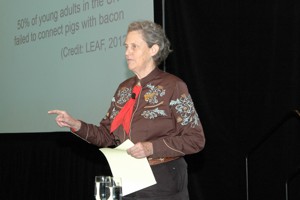New approaches needed to reach consumers on livestock welfare improvements
Date posted: January 14, 2016

Dr. Temple Grandin
Dr. Temple Grandin, arguably the most well-known farm animal care researcher in the world, says consumers are still woefully behind in their knowledge of real progress in livestock handling in the industry. And she challenged delegates to the 2016 Banff Pork Seminar to motivate their industry to do a much better job of reaching out.
The good news in all of this, she says, is that there have been great improvements in animal handling in the industry.
"I've been in the industry for many years and I can remember times when animal handling at plants was really terrible," she says. Then she was hired by McDonald's, Wendy's and Burger King to implement animal welfare auditing of slaughter plants.
"The next two years I saw an exponential improvement in handling and stunning," says Grandin. "Today two major companies have video auditing where outside auditors randomly monitor handling. Yelling and hitting animals has stopped. It is a different and better industry today."
Knowledge gap
The bad news counterpoint to those improvements, Grandin says, is that consumers don't know about the improvements. It's her big frustration, she says.
How to change things? Not surprisingly, the outspoken leader has thoughts on that.
Where the industry is doing the worst job is with the rapidly expanding millennial generation, says Grandin. By 2020 they are projected to be nearly 20 percent of the population while baby boomers will drop from 27 percent today to about 20 percent.
Online technologies have transformed how millennials communicate. Surveys show 21 percent of millennials use social media as their main source of information. Fortunately nearly 35 percent still read a national source of news. Regardless, the younger generation gets farther and farther away from the farm, with only 50 percent ever having visited a farm that raises livestock or poultry.
Here are three key points important to understand.
Young people lack knowledge. A significant portion of consumers lack a basic knowledge of animals and agriculture. They are the first to grow up in a digital world. Many young people have been educated in a classroom where practical hands-on activity has been removed. Many have never sewed, cooked, fixed things or worked on a car.
"I believe that lack of hands-on activity growing up causes people to think in vague abstractions," says Grandin. "Children who grow up doing physical things quickly discover that stuff doesn't always work. Things in a practical world can be really well made but can never be perfect.
"Fortunately many of our new students do want to learn and want to do more hands-on when they major in animal science."
Values matter to young consumers. Research shows that communication with young people is more effective if it comes from somebody who shares their values. Research also shows farmers are a trusted source of information for consumers.
Programs have been developed that allow producers to communicate directly with consumers. The pork industry needs to create similar programs.
Animal welfare is important to millennials. Surveys of young people who had become parents showed the vast majority are more concerned about chemicals, antibiotics and ingredients in food compared to their parents.
Two studies, for example, showed nearly 80 percent stated humane production practices were important. Consumers perceive small farms are better than big farms and nearly 64 percent in one study felt food companies will put profits first over treatment of animals.
Building a positive response
The pork industry should respond by showing consumers exactly what they are doing and explain it.
Grandin did a video with the North American Meat Institute showing market pigs being loaded on a truck and then taking a tour of a large pork plant. "It has 346,845 views on YouTube and about 80 percent likes," she says. "I explain how the plant works in a matter of fact manner. To improve credibility it explains I am a professor of animal science."
Another example is locations where tourists and students can tour a large, full scale working pig or dairy farm. To maintain biosecurity visitors look at pugs through windows and they can talk to people using microphones.
Science museums are another opportunity for agriculture to be displayed. And people in the pork industry need to communicate with friends they have in the big cities.
Remember what you do for chores is interesting to folks from the city, says Grandin.
"My generation has a tendency to bash millennials," she adds. "But talking to the younger generation is exactly what we should be doing."
People who raise pigs need to reach out. It can be as simple as cute pictures of piglets or showing procedures for washing and keeping the building clean.
Livestock industry's negative response
Grandin takes aim at two issues she believes reflect negatively on agriculture.
"Ag Gag" laws which make it a crime for undercover investigators to take pictures she says make agriculture look really guilty.
And sow stalls are a degree of confinement that even older consumers on surveys do not accept.
A closing thought
The older generation absolutely must reach out to the younger generation, says Grandin. "I am proud of the things I have done to improve animal agriculture. There are practices in animal agriculture that need to be improved and there are others that absolutely need to be defended.
"Fighting over sow stalls is likely not worth it."
Return to the News Release Index
